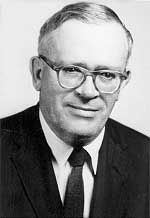 Richard M. Weaver, a distinguished educator most famous for his visionary books like Ideas Have Consequences, also wrote a humble handbook of English composition: A Rhetoric and Handbook. It covers everything a college freshman could need to know about writing: from spelling and punctuation to the structure of arguments and the tone of an author’s written voice. And when Weaver needs to cite a sentence or paragraph as a specimen for his students to dissect, his choice of examples is exquisite: Lincoln, Burke, Mencken, Lewis, the founding fathers, Thoreau, Robert Penn Warren, Russell Kirk, Perry Miller, Friedrich Hayek, John Henry Newman, and other master stylists crowd the pages of Weaver’s composition handbook.
Richard M. Weaver, a distinguished educator most famous for his visionary books like Ideas Have Consequences, also wrote a humble handbook of English composition: A Rhetoric and Handbook. It covers everything a college freshman could need to know about writing: from spelling and punctuation to the structure of arguments and the tone of an author’s written voice. And when Weaver needs to cite a sentence or paragraph as a specimen for his students to dissect, his choice of examples is exquisite: Lincoln, Burke, Mencken, Lewis, the founding fathers, Thoreau, Robert Penn Warren, Russell Kirk, Perry Miller, Friedrich Hayek, John Henry Newman, and other master stylists crowd the pages of Weaver’s composition handbook.
On the first page, Weaver coaches his students in how to select a subject for an essay:
One of the great revelations of education comes when we perceive that there is no such thing as a naturally uninteresting subject. Anything can be interesting if one knows enough about it. A certain amount of imagination is required and a certain focusing of the view, of course, but there is no reason why a small thing should be of small interest, or why a familiar one should be devoid of rich possibilities.
Weaver puts this theory into operation in his own book, finding what can fascinate an active mind in topics like diction, sentence arrangement, and paragraph structure. Thus he practices the thing he preaches.
But probably the greatest practitioner of the doctrine that “there is no such thing as a naturally uninteresting object” was G. K. Chesterton, who tirelessly worked out the theme in books whose very titles show his commitment to the doctrine: Tremendous Trifles, All Things Considered, Generally Speaking, and All is Grist. He once wrote a memorable essay “On Lying in Bed,” and, even more impressively, managed to write a truly stimulating essay on “What I Found In My Pocket.” This essay was provoked when Chesterton found himself trapped on a long journey with nothing to read and no scenery to look at. He resorted to the contents of his pockets.
What did Chesterton find in his pocket? Nothing special. But he knew how to apply the three skills that Weaver commends: 1. He had some background knowledge, 2. he had “a certain amount of imagination,” and 3. he knew how to focus his view.
Now I deny most energetically that anything is, or can be, uninteresting. So I stared at the joints of the walls and seats, and began thinking hard on the fascinating subject of wood. Just as I had begun to realise why, perhaps, it was that Christ was a carpenter, rather than a bricklayer, or a baker, or anything else, I suddenly started upright, and remembered my pockets. I was carrying about with me an unknown treasury. … I began to take the things out.
Yes, reader, he began to take things from his pockets! The suspense is palpable. I won’t ruin it by telling you what he found, you can read it for yourself if you’d like. My point is just to use Chesterton as an illustration of what Richard Weaver taught as he taught composition: “There is no such thing as a naturally uninteresting subject.”
There is, on the other hand, such a thing as naturally uninteresting writing on any subject. That’s why Weaver wrote about how to write.